- Home
- T. H. White
Once & Future King 05 - The Book of Merlyn
Once & Future King 05 - The Book of Merlyn Read online
Publisher's Statement
The Book of Merlyn, written by T. H. White during World War II, was intended to be the concluding book of a planned five-book volume entitled The Once and Future King. While The Once and Future King was indeed finally published in 1958, The Book of Merlyn was not included. This is the first time it has ever fully appeared in print.
White did not see proofs of The Book of Merlyn after the complete manuscript was submitted for publication late in 1941, and, as he was in the habit of making corrections and revisions once his work was set in type, this manuscript was not in final form when it came to us. However, it seemed to be so nearly finished that only minimal editing was necessary.
The 1958 Putnam edition of The Once and Future King was used as a guide in our editing. The use of punctuation in dialogue was
regularized. All errors in spelling were corrected, and British and archaic spellings were retained. Book titles and, usually, genus/ species names were italicized, and, where White had been inconsistent in capitalizing such words as badger, man, and democracy, capitalization was regularized. In a few cases, where the typist had obviously omitted a word, that word has been inserted.
Two episodes in The Book of Merlyn—scenes where Merlyn transforms Arthur into an ant and later into a goose—have already appeared somewhat out of context in The Sword in the Stone as published in the tetralogy. White had originally written them for The Book of Merlyn in his five-book version of The Once and Future King, and we have therefore let them stand.
Where Latin or Greek is not translated in the original manuscript, a translation has kindly been provided by Peter Green.
THE BOOK OF MERLYN
The Unpublished Conclusion to The Once and Future King
The Story of the Book
The dream, like the one before it, lasted about half an hour. In the last three minutes of the dream some fishes, dragons and such-tike ran hurriedly about. A dragon swallowed one of the pebbles, but spat it out.
In the ultimate twinkling of an eye, far tinier in time than the last millimetre on a six-foot rule, there came a man. He split up the one pebble which remained of all that mountain with blows; then made an arrow-head of it, and slew his brother.
The Sword in the Stone Chapter 18, original version
"My FATHER made me a wooden castle big enough to get into, and he fixed real pistol barrels beneath its battlements to fire a salute on my birthday, but made me sit in front the first night—that deep Indian night—to receive the salute, and 1, believing I was to be shot, cried."
Throughout his life White was subject to fears: fears from without—a menacing psychopathic mother, the prefects at Cheltenham College "rattling their canes," poverty, tuberculosis, public opinion; fears from within—fear of being afraid, of being a failure, of being trapped. He was afraid of death, afraid of the dark. He was afraid of his own proclivities, which might be called vices: drink, boys, a latent sadism. Notably free from fearing God, he was basically afraid of the human race. His life was a running battle with these fears, which he fought with courage, levity, sardonic wit, and industry. He was never without a project, never tired of learning, and had a high opinion of his capacities.
This high opinion was shared by his teachers at the University of Cambridge. When tuberculosis tripped him in his second year, a group of dons made up a sum of money sufficient to send him to Italy for a year's convalescence. He took to Italy like a duck to water, learned the language, made some low friends, studied pension life, and wrote his first novel, They Winter Abroad. The inaugurator of the convalescent fund recalled: "... he returned in great form, determined to have the examiner's blood in Part II; and sure enough in 1929 he took a tearing First Class with Distinction."
In 1932, on a Cambridge recommendation, he was appointed head of the English Department at Stowe School.
It was a position of authority under an enlightened headmaster who allowed him ample rope. His pupils still remember him, some for the stimulus of his teaching, others for the sting of his criticism, others again for extracurriculum rambles in search of grass snakes. He learned to fly, in order to come to terms with a fear of falling from high places, and to think rather better of the human race by meeting farm laborers at the local inn. After a couple of years he tired of Stowe, and decided on no evidence that his headmaster meant to get rid of him. With poverty a fear to be reckoned with, he constructed two potboilers and compiled another. An Easter holiday fishing in rain and solitude on a Highland river showed him what he really wanted—to write in freedom, to land a book of his own as well as a salmon.
At midsummer 1936 he gave up his post and rented a gamekeeper's cottage at Stowe Ridings on the Stowe estate. The compiled potboiler, made up of extracts from his fishing, hunting, shooting, and flying diaries and called England Have My Bones, sold so well that its publisher undertook to pay him Ł200 a year against a yearly book.
The gamekeeper's cottage stood among woodlands—a sturdy Victorian structure without amenities. It was by lamplight that White pulled from a shelf the copy of the Morte d'Arthur he had used for the essay on Malory he submitted for the English tripos, Part I. Then he had been concerned with the impression he would make on the examiners. Now he read with a free mind.
One of the advantages of having taken a First Class with Distinction in English is a capacity to read. White read the Morte d'Arthur as acutely as though he were reading a brief. The note in which he summarized his findings may be his first step toward The Once and Future King:
"The whole Arthurian story is a regular greek doom, comparableto that of Orestes."
"Uther started the wrong-doing upon the family of the duke of Cornwall, and it was the descendant of that family who finally revenged the wrong upon Arthur. The fathers have eaten sour grapes etc. Arthur had to pay for his father's initial transgression, but, to make it fairer, the fates ordained that he himself should also make a transgression (against the Cornwalls) in order to bind him more closely in identification with the doom."
"It happened like this."
"The Duke of Cornwall married Igraine and they had three daughters, Morgan le Fay, Elaine
and Morgause."
"Uther Pendragon fell in love with Igraine and slew her husband in war, in order to get her. Upon her he begot Arthur, so that Arthur was half brother to the three girls. But he was brought up separately."
"The girls married Uriens, Nentres and Lot, all kings. They would naturally have a dislike for Uther and anybody who had anything to do with Uther."
"When Uther died and Arthur succeeded him in mysterious circumstances, naturally Arthur inherited this feud. The girls persuaded their husbands to lead a revolt of eleven kings."
"Arthur had been told that Uther was his father, but Uther had been a vigourous old gentleman and Merlyn had very stupidly forgotten to tell Arthur who his mother was."
"After a great battle in which the 11 kings were subdued, Morgause, the wife of King Lot, came to Arthur on an embassy. They did not know of their relationship at this time. They fell for each other, went to bed together, and the result was Mordred. Mordred was thus the fruit of incest (his father was his mother's half brother), and it was he who finally brought the doom on Arthur's head. The sin was incest, the punishment Guinever, and the instrument of punishment Mordred, the fruit of the sin. It was Mordred who insisted on blowing the gaff on Launcelot and Guinever's affair, which Arthur was content to overlook, so long as it was not put into words."
En trentiesme annee de mon age Quand toutes mes hontes j'ai hues
White was thirty when he rented the gamekeeper's cottage. He had done with his past, he was on good terms with himself, he was
free. His solitude was peopled by a succession of hawks, a rescued tawny owl, a setter bitch on whom he unloosed his frustrated capacity to love. Now in the Morte d'Arthur, he had a subject into which he could unloose his frustrated capacity for hero worship, his accumulated miscellany of scholarship, his love of living, his admiration of Malory. It is as though, beginning a new subject, he wrote as a novice. Instead of the arid dexterity of the potboilers, The Sword in the Stone has the impetus and recklessness of a beginner's work. It is full of poetry, farce, invention, iconoclasm, and, above all, the reverence due to youth in its portrayal of the young Arthur. It was accepted for publication on both sides of the Atlantic, and in the United States was being considered by the Book of the Month Club—who took it. But it was 1938, the year of Munich; the pistol barrels in the toy fort were charged for more than a salute. Fear of war half choked him when he was fitted with a gasmask, retreated when Chamberlain bought peace on Hitler's terms, but could not be dismissed.
White's thinking was typical of the postwar epoch. War was a ruinous dementia. It silenced law, it killed poets, it exalted the proud, filled the greedy with good things, and oppressed the humble and meek; no good could come of it, it was hopelessly out of date. No one wanted it. (Unfortunately, no one had passionately wanted the League of Nations, either.) If, against reason and common sense, another war should break out, he must declare himself a conscientious objector. In the first lemming rush to volunteer, he wrote to David Garnett: "I have written to Siegfried Sassoon and the headmaster of Stowe. (my poor list of influential people) to ask them if they can get me any sensible job in this wretched war, if it starts. This is the ultimatum; I propose to enlist as a private soldier in one month after the outbreak of hostilities, unless one of you gets me an efficient job before that."
Chamberlain capitulated, the crisis went off the boil, White began The Witch in the Wood (the second volume of The Once and Future King) and was diverted to Grief for the Grey Geese, a novel he never finished. It was conceived in a state of intense physical excitement. He was alone, he was in the intimidating sea-level territory of the Wash, he was pursuing a long-ambitioned desire, intricately compounded of sporting prowess and sadism—to shoot a wild goose in flight. The theme is significant. The geese are warred on by the goose shooters. Among the goose shooters is a renegade who takes sides with the geese, deflecting their flight away from the ranks of the shooters. White plainly identifies himself with the renegade, while bent on shooting a wild goose.
In January 1939 he wrote to Garnett, who had invited him to go salmon fishing in Ireland: "If only I can get out of this doomed country before the crash, I shall be happy. Two years of worry on the subject have convinced me that I had better run for my life, and have a certain right to do so. I may just as well do this as shoot myself on the outbreak of hostilities. I don't like war, I don't want war, and I didn't start it. I think I could just bear life as a coward, but I couldn't bear it as a hero."
A month later he was in Ireland, lodging in a farmhouse called Doolistown, in County Meath, where he proposed to stay long enough to finish The Witch in the Wood (published shortly thereafter) and catch a salmon. It was his home for the next six and a half years. For six of them he never heard an English voice and rarely a cultivated one. Provincial Ireland swallowed him like a deep bog. He had escaped his doomed country, but he could not avoid being in earshot of it.
Diary. April 26th, 1939
Conscription is now seriously spoken of in England, and everybody lives from one speech of Hitler's to the next. I read back in this book at the various tawdry little decisions which I have tried to make under the pressure of the Beast; to be a conscientious objector, and then to fight, and then to seek some constructive wartime employment which might combine creative work with service to my country. All these sad and terrified dashes from one hunted corner to the next.
Meanwhile he tried to protect his peace of mind by dashes in new directions. Lodging in a Catholic household and treated as one of the family, he considered becoming a Catholic, Because his father had happened to be born in Ireland, he deluded himself with an idea of Irish ancestry. He read books on Irish history, with scholarly dispassionateness reading authors on either side of that vexed question; he tried to learn Erse, going once a week to the local schoolmaster for lessons and "doing an hour's prep every morning"; he looked for a habitation, and rented a house called Sheskin Lodge in County Mayo for the shooting; later, he made researches into the legendary Godstone on the island of Inniskea. More to the purpose, being involuntary, he was captured by the somber beauty, the desolate charm, of Erris—that part of County Mayo lying between the Nephin Beg range and the sea. It was at Sheskin Lodge, embowered in fuchsias and rhododrendron thickets and surrounded by leagues of bog, that he heard the last English voices. They were saying Goodbye. War had been declared, the visiting Garnetts were going back to England.
The tenancy of Sheskin ran out, he returned to Doolistown and listened to the news.
October 20th, 1939
There don't seem to be many people being killed yet—no hideous slaughters of gas and bacteria.
But the truth is going.
We are suffocating in propaganda instead of gas, slowly feeling our minds go dead.
October 23rd
The war as one hears of it over the wireless is more terrible than anything lean imagine of mere death, ft seems to me that death must be a noble and terrible mystery, whatever one's creed or one's circumstances of dying. It is a natural thing, anyway. But what is happening over the wireless is not natural. The timbre of the voices which sing about Hitler and death is a sneering, nasal mock-timbre. Devils in hell must sing like this.
By then he was preparing for The Ill-Made Knight (The Witch in the Wood, delivered to his publisher six months earlier, had been returned with a request that it might be rewritten) and making an analysis of the character of Malory's Sir Lancelot—with traits akin to his own:
"Probably sadistic, or he would not have taken such frightful care to be gentle.... Fond of being alone,"
In the analysis of Guenever, where he had nothing personal to go on, he speculates, and does his best to overcome his aversion to women. "Guenever had some good characteristics. She chose the best lover she could have done and was brave enough to let him be her lover." "Guenever hardly seems to have been a favourite of Malory's, whatever Tennyson may have thought about her," It was a new departure for White to approach a book so deliberately or write it so compactly. There is no easy-going writing in The Ill-Made Knight, where the Doom tightens on Arthur, and Lancelot is compelled to be instrumental in it by his love for Guenever.
He wrote it in Erris, in the small-town hotel at Belmullet, between researches into the Godstone, lying out on freezing mornings waiting for the passage of the wild geese, local jovialities, and drinking fits after which he would lock himself in his hotel bedroom in terror of the I.R.A.
On October 1 st, having completed The Ill-Made Knight, he put Erris behind him and went back to Doolistown to write The Candle in the Wind. This, the last Morte d'Arthur book, in which the doomed king staggers from defeat to defeat, already existed as the skeleton of a play. White was incapable of writing slowly. By midautumn the play was brought to life as a narrative, and he was considering titles for the complete tetralogy: The Ancient Wrong... Arthur Pendragon...
November 14th, 1940
Pendragon can still be saved, and elevated into a superb success, by altering the last part of Book 4, and taking Arthur back to his animals. The legend of his going underground at the end, into the badger's sett, where badger, hedgehog, snake, pike (stuffed in case) and all the rest of them can be waiting to talk it over with him. Now, with Merlyn, they must discuss war from the naturalist's point of view, as I have been doing in this diary lately. They must decide to talk thoroughly over, during Arthur's long retirement underground, the relation of Man to the other animals, in the hope of getting a new angle on his problem from this. Such, indeed, was Merlyn's
original objective in introducing him to the animals in the first place. Now what can we learn about abolition of war from animals?
Pendragon can still be saved. Another salvation was involved.
White had gone to Belmullet assuming himself to be at home in Ireland. He came away an Englishman in exile. He had been received, and welcomed as something new to talk about; he had never been accepted. Another Ancient Wrong forbade it—the cleft between the hated and the hating race. He was believed to be a spy (the rumour of an English invasion had kept most of Belmullet sitting up all night); his movements were watched; he was reported to the police and not allowed to leave the mainland; he had joined the local security force, but was asked not to attend parades. His disillusionment may have been rubbed in by the parallel with The Candle in the Wind, where Arthur's goodwill is of no avail against his hereditary enemies. Now another winter lay before him, a winter of intellectual loneliness, with only himself to consult, only himself to feed on. He had a roof over his head, a room to be alone in, regular meals, the hedged landscape of County Meath to walk his dog in, nothing much to complain of, nothing to go on with. War had imprisoned him in a padded cell, It was his own salvation he leaped at. On December 6th, he wrote to L. J. Potts, formerly his tutor at Cambridge, continuously his Father Confessor in Letters: "The next volume is to be called The Candle in the Wind (one has to add D.V. nowadays)... It will end on the night before the last battle, with Arthur absolutely wretched. And after that I am going to add a new 5th volume, in which Arthur rejoins Merlyn underground (it turns out to be the badger's sett of Vol. i) and the animals come back again, mainly ants and wild geese. Don't squirm. The inspiration is godsent. You see, I have suddenly discovered that (1) the central theme of Morte d'Arthur is to find an antidote to war, (2) that the best way to examine the politics of man is to observe him, with Aristotle, as a political animal. I don't want to go into all this now, it will spoil the freshness of the future book, but I have been thinking a great deal, in a Sam Butlerish way, about man as an animal among animals—his cerebrum, etc. I think I can really make a comment on all these futile isms (communism, fascism, conservatism, etc.) by stepping back— right back into the real world, in which man is only one of the innumerable other animals. So to put my 'moral' across (but I shan't state it), I shall have the marvellous opportunity of bringing the wheel full circle, and ending on an animal note like the one I began on. This will turn my completed epic into a perfect fruit, 'rounded off and bright and done."

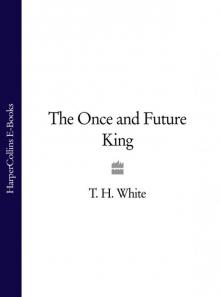 The Once and Future King (#1-4)
The Once and Future King (#1-4) Once & Future King 05 - The Book of Merlyn
Once & Future King 05 - The Book of Merlyn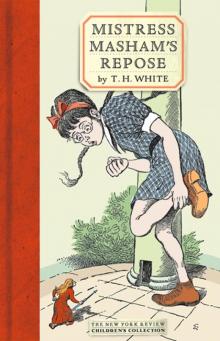 Mistress Masham's Repose
Mistress Masham's Repose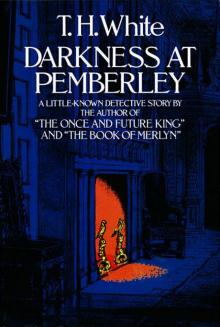 Darkness at Pemberley
Darkness at Pemberley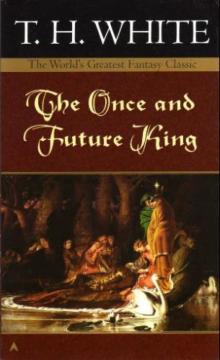 The Once and Future King
The Once and Future King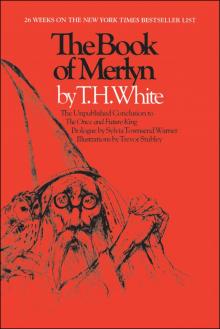 The Book of Merlyn
The Book of Merlyn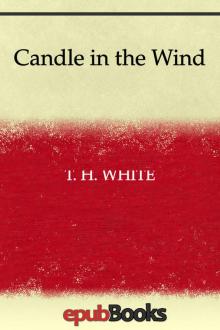 Candle in the Wind
Candle in the Wind